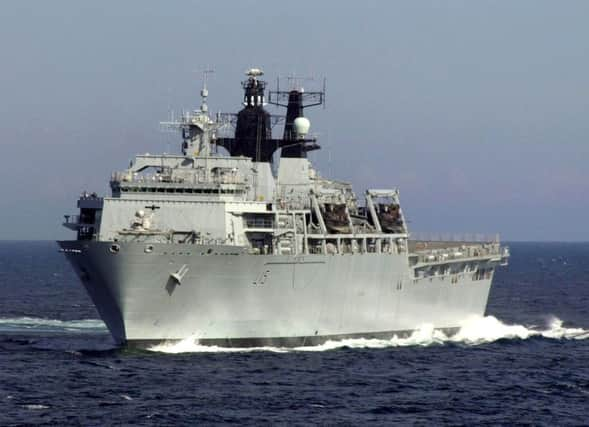Royal Navy could lose beach-landing ships in round of defence cuts


The Senior Service could see its two amphibious assault ships, HMS Albion and HMS Bulwark, taken out of service in a new round of cuts to the armed forces, the BBC’s Newsnight claimed yesterday.
It said such a move, which the Ministry of Defence described as ‘pure speculation’, would save money and free-up crew for the two new aircraft carriers, HMS Queen Elizabeth – the largest warship ever built for the navy, which is currently docked in Portsmouth – and HMS Prince of Wales.
Advertisement
Hide AdAdvertisement
Hide AdIt comes days after defence secretary Sir Michael Fallon used a speech at the Conservative Party conference to call for an increase in defence funding, as his ministry announced a £1bn support package for the Royal Navy fleet.
Newsnight reported the plan, coupled with the loss of 1,000 Royal Marines, had alarmed senior commando officers.
A senior Royal Marine officer blamed the introduction of the new carriers for the Senior Service’s financial and manning problems.
He told the BBC: ‘This is the worst procurement decision of the past half century – that’s what the Royal Marines are being sacrificed for.’
Advertisement
Hide AdAdvertisement
Hide AdIf confirmed the loss of Albion, a former flagship of the Royal Navy, and Bulwark would leave the Navy without a dedicated amphibious assault ship.
Beach landings in countries and areas where the enemy controls the harbours have been used in many modern conflicts, including D-Day during the Second World War and the Falklands War.
In a speech to the Conservative Party conference in Manchester on Tuesday, Sir Michael said the armed forces must ‘modernise’ the way it worked.
He said: ‘As threats intensify, my department is now looking right across government to make sure we are doing enough, spending enough, to properly protect our country against all of those threats – cyber, hybrid warfare, rogue states, terrorist attacks.
Advertisement
Hide AdAdvertisement
Hide Ad‘Spending two per cent of GDP on defence is the minimum Nato commitment.
‘We meet it but we should always aim to do better still.’
An MOD spokesman said: ‘In the face of ever-changing threats, we are contributing to the cross-government review of national security capabilities and looking at how we best spend our rising defence budget to support that.
‘No decisions have yet been made and at this stage, any discussion of the options is pure speculation.’